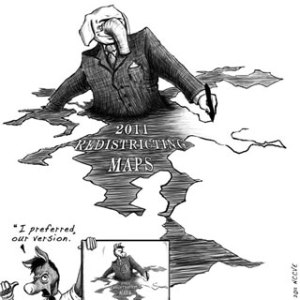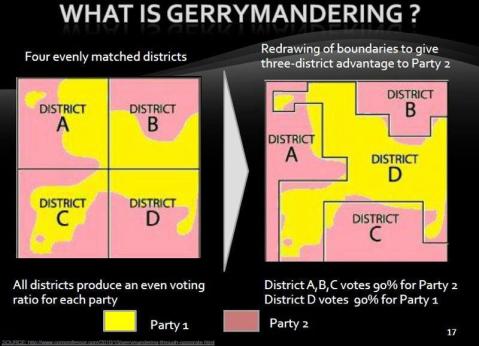Voter-approved election reforms push the U.S. closer to respecting international norms
Two election reforms were adopted by voters in Ohio and Maine this week, pushing the United States substantially closer to respecting international norms on holding free and fair, democratic elections.
In Ohio, a constitutional amendment was adopted by ballot initiative to ban gerrymandering districts for the state legislature – the politically charged and controversial process of drawing legislative districts to virtually guarantee certain electoral outcomes by packing votes in favor one political party over the other.
The amendment approved by voters on Tuesday will create a new, bipartisan commission to draw legislative districts that are compact and do not unfairly favor any party or candidate. It effectively said that district lines for the state legislature will be drawn to be competitive. Unfortunately, however, the reform only applies to elections to the state legislature and will not affect the undemocratic gerrymandering procedure for congressional elections.
The new system, as explained by Ballotpedia, will consist of a seven-member Ohio Redistricting Commission:
The members are the governor, state auditor, secretary of state, one person appointed by the speaker of the House of Representatives, one person appointed by the legislative leader of the largest political party in the House of which the speaker is not a member, one person appointed by the president of the Ohio Senate and one person appointed by the legislative leader of the largest political party in the Senate of which the president is not a member. The new commission requires two members from the minority party or 29 percent of the commission seats, versus a single member under the former system.
To approve a redistricting plan for 10 years, at least two from each major political party have to agree to the plan. If the commission fails to pass a plan by a bipartisan vote, members must pass a plan by a simple majority vote of any four members, but this plan only lasts four years.
All legislative districts are required to be compact and made of “contiguous territory, and the boundary of each district to be a single nonintersecting continuous line.” The amendment forbids district plans from favoring or disfavoring either political party.
The reform, which will take effect in 2021 when the next redistricting occurs, will help ensure that the U.S. begins living up to its international election-related commitments, as spelled out in agreements such as the International Covenant on Civil and Political Rights and the 1990 OSCE Copenhagen Document. But because it does not apply to elections for the United States Congress, its effect will be limited.
Although some campaigners had advocated including congressional redistricting reform in the amendment, proponents backed off after Arizona State Legislature v. Arizona Independent Redistricting Commission was sent to the United States Supreme Court. Some critics believe Speaker of the House John Boehner pressured state lawmakers to drop any proposed changes to the corrupt system of drawing congressional districts.
 In advocating that reformers drop their efforts to change congressional redistricting procedures, however, Boehner essentially admitted to the deep corruption embedded in the system of election-rigging known as gerrymandering.
In advocating that reformers drop their efforts to change congressional redistricting procedures, however, Boehner essentially admitted to the deep corruption embedded in the system of election-rigging known as gerrymandering.
“For 40 years the Democrat Party had the pencil in their hands and for the last 20 years we’ve had the pencil,” he said. “When you’ve got the pencil in your hand, you’re going to use it to the best of your advantage.”
International observers deployed by the OSCE to monitor U.S. adherence to commitments in the Copenhagen Document have long pointed to the prevalence of gerrymandered congressional districts as one of the major hindrances to holding democratic elections in the United States.
The OSCE’s final report on the 2010 midterm elections noted for example that due to gerrymandering, “There is a broad perception that a significant number of congressional districts are non-competitive as the outcome of the election could be predicted with a high degree of probability. In these mid-term elections, one senator and 27 candidates for members of the House were elected unopposed.”
The OSCE reiterated a recommendation contained in the final report on the 2006 midterm elections: “With a view to ensuring genuine electoral competition in congressional districts, consideration could be given to introducing procedures for drawing district boundaries that will be based on criteria other than voters’ voting histories and perceived future voting intentions.”
In a publication issued in 2013, the OSCE further outlined best electoral practices for member states (including the U.S.), including a tacit criticism of the American system of drawing congressional districts. “Electoral constituencies should be drawn in a manner that preserves equality among voters,” noted the OSCE, adding that “the manner in which constituencies are drawn should not circumvent the principle of equal suffrage.”
This would help ensure the U.S. lives up to its obligations in the 1990 OSCE Copenhagen Document, including the following:
To ensure that the will of the people serves as the basis of the authority of government, the participating States will
(7.1) — hold free elections at reasonable intervals, as established by law;
(7.2) — permit all seats in at least one chamber of the national legislature to be freely contested in a popular vote;
(7.3) — guarantee universal and equal suffrage to adult citizens;
Another important reform adopted on Tuesday was a clean elections amendment approved by the voters of Maine, which beefed up their state financing systems as an alternative to big money. Specifically, the initiative strengthened the Maine Clean Elections Act by increasing funding from $2 million to $3 million for the Maine Clean Elections Fund, increasing penalties for violating campaign finance disclosure rules, adjusting political ad disclosure rules, and allowing candidates to qualify for additional funds.
The reform establishes the state of Maine as a U.S. leader in clean elections and transparency in campaign financing, another area that has long been a concern of international observers monitoring U.S. elections. Following last year’s midterm elections, OSCE observers noted:
The ability of independent special interest groups to produce and air campaign-style advertisements without disclosing their sources of funding limited the ability of voters to judge the information that they were presented with. This lack of transparency undermined the ability of legally mandated bodies to provide accountability. Further, the purely legalistic interpretation of what constitutes co-ordination between campaigns and political action committees undermined the legal framework intended to bring transparency to campaign spending.
Although international election-related commitments are somewhat ambiguous on the topic of campaign finance laws, it is widely understood that unregulated private money has the potential for tilting the playing field in favor of a particular party or candidate, thus potentially violating the requirement in the Copenhagen Document for OSCE member states to “provide political parties and organizations with the necessary legal guarantees to enable them to compete with each other on a basis of equal treatment before the law and by the authorities.”
In its 2013 guidelines, the OSCE warned of the impact that unregulated campaign financing can have on electoral systems, noting that “there is the risk of undue influence that can result from excessive or disproportionate contributions by a single contributor or group of contributors.”
Following the 2010 midterms, OSCE election observers noted that “Money played a significant role, creating an uneven playing field between candidates. About three-quarters of the total of upwards four billion dollars was spent on political campaign ads on television and radio. The ads inundated the airwaves, turning many voters off.”
In its statement on the 2012 general elections, the OSCE again stressed “the unprecedented and often negative role played by private campaign financing [which] has a potential to impact negatively on the fairness of the process.”
If more states begin following Maine’s lead, it could have a chance of finally leveling the playing field and improving the fairness of the process.
Tags: 1990 copenhagen document, 1990 osce copenhagen document, election administration, election reform, election-rigging, iccpr, international covenant on civil and political rights
About The Compliance Campaign
Campaigning for a United States in compliance with its international obligations. Follow on Twitter here: https://twitter.com/compliancecamp Facebook: https://www.facebook.com/compliancecamp Comments, article submissions or news leads are welcome at compliancecampaign [at] gmail.com.Recent Posts
- U.S. accuses Russia of war crimes but undermines the international body that prosecutes war crimes
- Global condemnation of Russia’s war on Ukraine underscores international community’s hypocrisy
- Jill Stein-bashing and the internationally recognized right of third parties to compete
- ‘Russiagate’ impeachment push reveals U.S. indifference to corruption and war crimes
- World moves to ban nuclear weapons as U.S. flouts obligations, moves to revamp arsenal
Categories
Blogroll
- ACLU
- Amnesty International
- Arms Control Now
- Bill of Rights Defense Committee
- Center for Research on Globalization
- Death Penalty Information Center
- Democracy Now!
- Essential Opinion
- Fair Vote
- Global Issues
- Global Security Newswire
- Human Rights First
- Human Rights Watch
- If Americans Knew
- Institute for Policy Studies
- Jurist.org
- Just Foreign Policy
- Latino Political Avenue
- National Lawyers Guild
- National Security Archives
- Partnership for Civil Justice
- People's Blog for the Constitution
- Republic Report
- SCOTUSblog
- Torture Accountability Center
- US Campaign to End the Israeli Occupation
- US Human Rights Network
- Witness Against Torture


